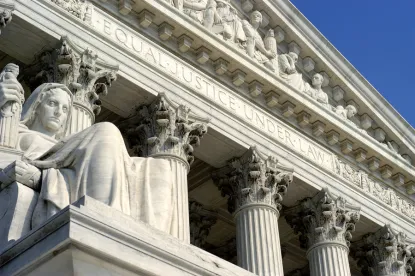Today, the Court issued a press release postponing oral arguments currently set for April (the last scheduled sitting of OT19). Though the Court left open the door to rescheduling some cases from the March and April sessions before the end of the Term, it seems more likely that most of them will either be rescheduled for OT20 or decided without argument. What remains to be seen is how those cases that both cannot wait and demand oral argument (for example, the Trump tax-return cases) will be managed. We suspect that the Court, an institution that has resisted televising or even permitting live audio broadcast of oral arguments will be pretty wary of “zoombombing.”
The Court issued only one decision this week, but boy was it a doozy: In Citgo Asphalt Refining Co. v. Frescati Shipping Co. (No. 18-565), the Court held that the plain language of a safe-berth clause in a particular subcharter shipping agreement establishes a warranty of safety. Okay, maybe you detected a hint of sarcasm there, but really, as our colleague Joe Grasso has assured us, it’s a very important decision to the maritime and marine insurance injury, not least because it resolves a circuit split over the meaning of a common term in a standard maritime form contract.
Here’s what happened. In 2004, the M/T Athos I, a 748-foot oil tanker, had an allision with a nine-ton anchor that had been left on the bed of the Delaware River. (That’s allision, not collision; like Justice Sotomayor, the author of the Court’s opinion, we can’t resist using this precise maritime term for “the contact of a vessel with a stationary object.”) The allision caused 264,000 gallons of heavy crude oil to spill into the river. The question in the case, essentially, is who pays for that clean-up, the charterer, CASCO, or the owner of the vessel, Frescati Shipping. Federal law requires a vessel’s owner to cover the cleanup costs in the first instance, subject to partial reimbursement by the Government’s Oil Spill Liability Trust Fund. In this case, Frescati paid $45 million toward cleanup and the Fund paid $88 million. But then they both teamed up to recover their costs from CARCO, the company that chartered the vessel. They pointed to the safe-berth clause in their subcharter agreement , which was from a widely used template known (for some reason) as the ASBATANKVOY form. That clause provides as follows: “The vessel shall load and discharge at any safe place or wharf, . . . which shall be designated and procured by the Charterer, provided the Vessel can proceed thereto, lie at, and depart therefrom always safely afloat, any lighterage being at the expense, risk and peril of the Charterer.” That language, Frescati and the Fund argued (citing a Second Circuit decision), amounted to an express warranty of the safety of the berth selected by the charterer, CASCO. Citing a Fifth Circuit decision, CASCO argued that the language only imposed a duty of diligence and not a warranty of safety. The Third Circuit sided with Frescati and the fund, holding that the safe-berth clause was an express warranty of safety “made without regard to the amount of diligence taken by the charterer” in selecting the berth. The Supreme Court granted cert to resolve the deepening circuit split over the meaning of this safe-berth clause, and affirmed.
Writing for a 7-2 majority, Justice Sotomayor insisted that the Court’s analysis begins and ends with the text of the safe-berth clause. The clause contains no qualifying language and therefore imposes on the charterer an absolute duty to select a safe berth. That absolute duty amounts to a warranty of safety. Justice Sotomayor was untroubled by the fact that the clause does not actually invoke the term “warranty,” because it is well settled that statements of material fact in a charter party are warranties, regardless of how they are labeled. With respect to CARCO’s argument that the safe-berth clause merely imposes a duty of due diligence in selecting a safe berth, Justice Sotomayor noted that tort concepts like due diligence generally have no place in contract analysis. Parties are free to contract for limitations on liability (and presumably will in the future), but there was no such qualification in the ADFASDJOPJW ASBATANKVOY form. CARCO threw a bunch of other arguments at the Court, but they were all rebuffed by the plain language of the safe-berth clause.
Though usually a plain-meaning enthusiast, Justice Thomas dissented in this case, joined by Justice Alito. Though he agreed that the Court had provided a clear background rule for the maritime industry to contract against, he argued that the rule in fact finds no basis in the underlying contract’s plain text. Instead, he read the rule to provide the charterer with the right to designate a berth, but allow the vessel the right to refuse it if it is unsafe. He found it notable that the safe-berth clause contained no warranty language, especially because the contract elsewhere contained terms like “Owner warrants” or “Charterer warrants.” And he pointed to Gilmore and Black (the “leading admiralty treatise”) for further support for his reading.
All in all, this was a pretty great decision for Frescati and the Feds, and a pretty awful one for CARCO. For the rest of us, however (and yes, we’re lumping ourselves in with the various owners and charters in the maritime shipping industry), it simply provides a clear background rule that parties can contract against. So next time someone presents you with the ol’ ASBATANKVOY form, be sure to give Joe Grasso a call before you sign.
That was the only opinion this week, though the Court did grant cert in one additional case: In Brownback v. King (No. 19-546), the Nine will decide whether a final judgment in favor of the United States in an action brought under the Federal Tort Claims Act bars a claim under Bivens that is brought by the same claimant, based on the same injuries, and against the same governmental employees whose acts gave rise to the FTCA claim. Wouldn’t exactly call that a nail-biter, but then again, that statement of the issue comes from the Government’s cert petition.
That’ll do it for this week. Stay tuned and stay safe.





 />i
/>i
